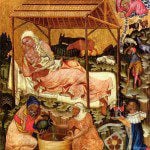If we operate by way of the secular calendar, Christmas is over—except for “after Christmas” sales and returns, as well as Christmas dinner leftovers. But for the Christian calendar, Jesus’ life at Christmastide is far from over; it has only just begun! Far from being an afterglow or an afterthought, the New Testament and liturgical accounts of Jesus’ early days of life give us reasons for hope in the midst of post-Christmas blues.
Christmastide, as the Christmas season is called, lasts forty days—from Christmas Eve to February 2nd with the Presentation of the Child Jesus in the Temple, according to the traditional liturgical calendar (Refer to “Christmastide: The Celebration Has Just Begun!” for a treatment of the season, including the various Christian feasts considered part of Christmastide in the older, traditional Catholic calendar; see also “Does Christmas End on Epiphany?” and the Orthodox account known as the “Presentation of Christ in the Temple”). Thus, on this dating, Christmas did not end with the passing of December 25th or even after the Twelve Days of Christmas, which range from December 25th to January 6th with the Feast of Epiphany (Refer here: “The Real 12 Days of Christmas”).
Now for those suspicious of traditional church liturgy, but who are still quite taken with the New Testament portrayal, take to heart the appearance of Jesus in the Temple for his presentation. I doubt Simeon and Anna had traveled to Bethlehem to see the baby Jesus on his birthday, which we associate today with December 25th (See “How December 25 Became Christmas”). According to the Church calendar, their Christmas cheer began on the equivalent of February 2nd, as they witnessed the presentation of the baby Jesus in the Temple on the fortieth day after his birth (See Luke 2:22-38; see also Leviticus 12:1-8 and Exodus 13:12-15; this is the time of Mary’s purification and the redemption of Jesus as the firstborn son).
Simeon and Anna had been waiting long and hard for the appearance of the Messiah, who was and is the glory of Israel and light to the Gentiles. Anna was well-advanced in years, and a widow for much of her life. She stayed constantly in the Temple, worshiping, fasting as well as praying daily and nightly. Upon encountering the baby Jesus and his parents, Anna spoke about him to everyone around her in the Temple awaiting Jerusalem’s deliverance (Luke 2:38). For his own part, Simeon was led by the Spirit into the Temple where the Spirit’s long-awaited promise to him was fulfilled (that is, Simeon would not see death until seeing the Messiah). There Simeon beheld Jesus, lifted him in his arms, and cried out saying,
Lord, now you are letting your servant depart in peace, according to your word; for my eyes have seen your salvation that you have prepared in the presence of all peoples, a light for revelation to the Gentiles, and for glory to your people Israel (Luke 2:29-32; ESV).
Who knows how hard life had been for these two saints? The passing of loved ones, the coming of old age, the oppressive weight of Roman rule… But no matter the adversity, they never lost hope.
I have been told that January is always the worst month for depression, even suicide. Reasons that I have been given include unfulfilled expectations from Christmas, fears in the new year (See for example “2017: Year of Hope or Year of Fear?”), credit card bills filled with payments due from Christmas shopping, and the less frequent hours of daylight as well as poor weather in many places.
There are many reasons for depression, including physiological ones, and many practical ways to address it (See “5 Ways to Survive January — the Most Depressing Month of the Year”). Spiritual meditation can also help. As we who are followers of Jesus cherish Luke 2 and Christmastide, we will take energizing comfort from the fact that Jesus is with us in the midst of our trials and looming darkness. So, no matter if you take down the Christmas tree today, tomorrow or sometime next month, know that Jesus is our salvation. He is our light and our glory throughout late December, the hard month of January and beyond, not simply on Christmas Day.
The Institute for Cultural Engagement: New Wine, New Wineskins will host a conference on mental health titled “Mental Health: Building Bridges, Not Walls,” on February 26-27, 2021. Check out our website for updates in the coming weeks. For more on the church year and its importance for the Christian imagination and approach to life, check out the sampler here at this link to my new book, Setting the Spiritual Clock: Sacred Time Breaking Through the Secular Eclipse. Here is the YouTube trailer for the book. You can get a 40% discount for the book if you order by January 31st at the publishing house website. Please be sure to use the discount code of ADVENT20 when placing your order. Thank you.














